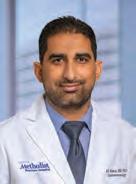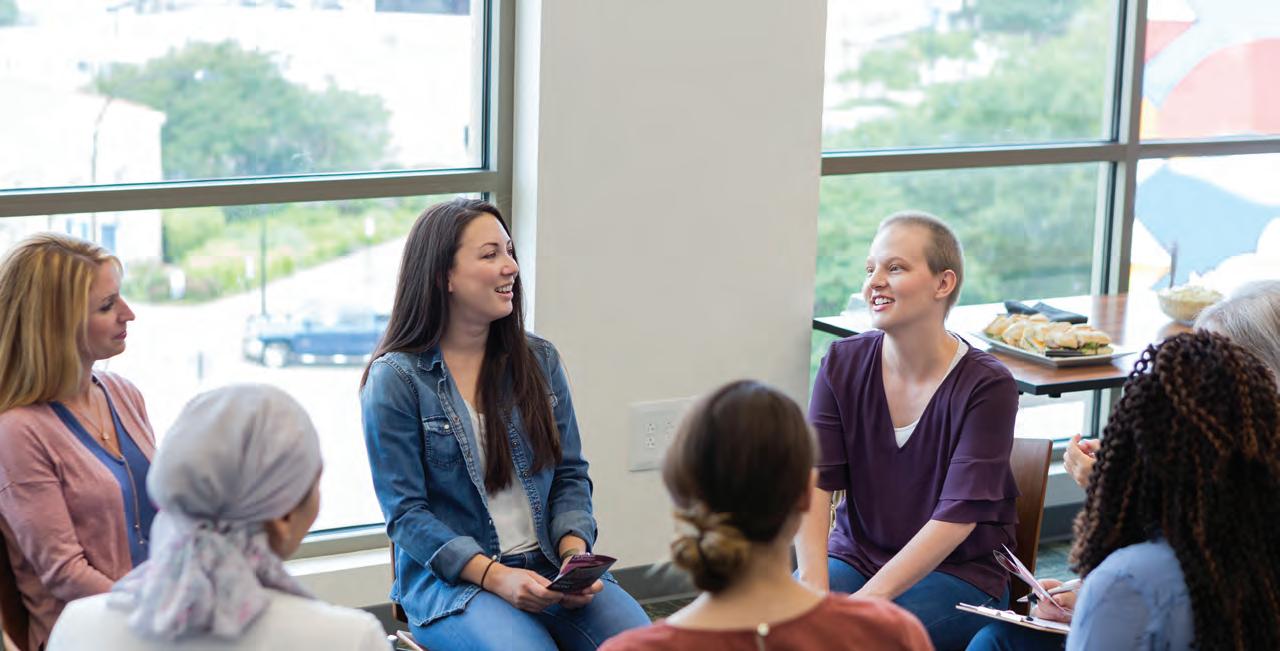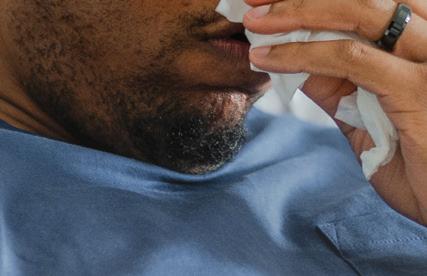LEADING MEDICINE
Exploring Weight Loss Surgery Options
KNOW
YOUR NUMBERS:
How Your Doctor Can Help You Stay in a Healthy Range
Finding Relief from Carpal Tunnel Symptoms


Exploring Weight Loss Surgery Options
KNOW
How Your Doctor Can Help You Stay in a Healthy Range
Finding Relief from Carpal Tunnel Symptoms

The new year marks an exciting time for Houston Methodist Baytown Hospital. In November, we opened our five-story Unity Tower. After several years of construction and a global pandemic, we are excited to celebrate the completion of the project and welcome the community. The new facility provides the most advanced medical care and services to Baytown and the surrounding communities.
Unity Tower offers new 75 expansive private patient rooms, an intensive care unit featuring cutting-edge medical technologies , and an entire floor dedicated to childbirth and obstetric services. This facility includes vital infrastructure and enhances Houston Methodist Baytown’s ability to serve our community and meet the growing demands of Baytown, and east Harris, and Liberty and Chambers counties.

Unity Tower will serve as a focal point for the campus. The name has significant meaning for Houston Methodist Baytown Hospital. It unifies our campus and our staff with the community to promote a caring and spiritual healing environment . It aligns perfectly with our values and culture of diversity, equity and inclusion. The tower’s design helps solidify Houston Methodist Baytown as part of Houston Methodist.
In April, Houston Methodist B aytown will celebrate 75 years of service and providing unsurpassed medical care to the Baytown and surrounding communities. I am excited to share this new space with our community and to continue our mission of service for many more years to come.
Best, David P. Bernard, MBA/MHA, FACHE Chief Executive Officer Houston Methodist Baytown Hospital

There are those veins that you’ve seen your whole life, like the one in your upper forearm that’s often used when you need blood drawn. But what about that unusual clump of veins that's recently — quite literally — popped up on your legs or somewhere else on your body? Should you be worried about these veins?

“That is a common question that I get in my office, and usually, the answer is no, these won’t hurt you at all, said Dr. Margaret Jackson, vascular surgeon at Houston Methodist DeBakey Heart & Vascular Center at Baytown.
Varicose veins are those red, purple, or blue veins that seem to lie just under the skin, and don’t go away with massage, change in position, hot, or cold, or really anything you do. They are veins that have become diseased over time, usually due to genetics, age, or having a job where you stand on your feet or sit at a desk for long periods.
Spider veins are the smaller version of varicose veins. “When the veins are damaged, blood will pool in your legs. If this happens, you will notice that your legs are heavy, tired, achy, and maybe even swollen at the end of the day,” said Jackson.
This condition is called chronic venous insufficiency, and it can progress over your lifetime if it isn’t treated. The end result of many years of untreated venous insufficiency can be lymphedema, which is swelling that doesn’t resolve, or even open sores on your skin.
Things you can do at home to relieve your symptoms:
■ Wearing compression socks
■ Exercising leg muscles
■ Elevating your legs
■ Avoiding sitting or standing for long periods
“Here in my office, we start with compression and an ultrasound which will evaluate the valves in your legs. If we see that your valves are so leaky that they are letting a lot of blood pool in your legs, you could benefit from a procedure called an ablation, where we close a leaky vein from the inside,” Jackson said.
Smaller spider veins can be treated with an injection.
If you have heaviness in your legs or swelling at the end of the day, it’s time to make an appointment. If you have swelling that never goes away or open sores, it’s definitely time to make an appointment. •
The specialists at Houston Methodist DeBakey Heart & Vascular Center at Baytown are here to help answer your questions. To schedule an appointment, visit houstonmethodist.org/heart-vascular or call 832.556.6625

Pesky, uncomfortable, embarrassing and painful — these may describe how you feel if you have hemorrhoids. As common as they are, we know it can still feel awkward to talk about. Dr. Christina Warner, a colorectal surgeon at Houston Methodist Baytown Hospital, offers answers to your most pressing questions.

Hemorrhoids are swollen veins in your anus and lower rectum that develop from increased pressure. “There are two kinds of hemorrhoids: internal and external,” Warner explained. “Internal hemorrhoids occur in the lower rectum and are usually painless. External hemorrhoids develop under the skin around the anus and tend to be more painful and irritating.”
Internal hemorrhoids may cause bleeding but are usually painless. External and prolapsed hemorrhoids can cause pain, itching, irritation and sometimes bleeding. Signs of hemorrhoids may include:
■ Bright red blood on toilet paper or in the toilet
■ Hard, sore lumps near the anus
■ Pain and itching, particularly when sitting or during bowel movements
Hemorrhoids develop from increased pressure in the lower rectum due to activities like:
■ Eating a low-fiber diet
■ Frequent diarrhea or constipation
■ Pregnancy
■ Sitting for long periods of time on the toilet
■ Straining during bowel movements
Increasing the amount of fiber in your diet and avoiding straining during bowel movements often help.
“Applying hemorrhoid creams, soaking in warm water and cleaning the area with a wet cloth can help provide comfort,” Warner added.
If home remedies aren’t offering relief, talk to your primary care provider (PCP) about other options. Your PCP may refer you to a specialist who can offer minimally invasive treatments that can help, including:
■ Coagulation, using heat to reduce its size
■ Ligation, cutting off the blood flow to the hemorrhoid
■ Sclerotherapy, injecting a chemical to shrink the hemorrhoid
“ These procedures can be done during your office visit with minimal discomfort,” Wagner said. “Surgical removal may also be an option for especially large, persistent or prolapsed hemorrhoids.”
Constipation is one of the main culprits of hemorrhoids. These tips can help:
■ Avoid sitting on the toilet for long periods of time.
■ Drink a lot of fluids. Aim for at least eight glasses of water a day.
■ Eat a diet high in fiber. Good sources of fiber include fruits, vegetables and whole grains.
■ Exercise regularly.
If your hemorrhoids don’t improve after a week of home care, get in touch with your primary care provider to see what other options could help. Blood in your stool is a common sign of hemorrhoids, but it can also be a symptom of other, more serious conditions. If you see blood in your stool, contact your doctor immediately. •
Don't delay care if your hemorrhoid signs and symptoms need attention. Houston Methodist is here to help. To schedule an appointment visit houstonmethodist.org/baytown or call 346.292.1470


Your primary care provider, or PCP, is one of your most important health resources. But what does a PCP do?
“A PCP’s main priority is to keep our patients healthy and catch any possible issues early on before they get serious,” explained Dr. Ahmed Mohammad, a family medicine physician at Houston Methodist Baytown. “PCPs monitor your overall health and wellness and help you understand your risks and ways to stay healthy.”

Your PCP performs annual check-ups and is usually the first stop if any illness or health concerns arise. They help you understand and reduce your risk for developing a wide variety of health problems. PCPs monitor your health and can recommend testing or refer you to specialty care when needed. Together, you and your PCP can help you continue to live the life you love.
“We’re here to build a partnership with each patient,” Mohammad said. “That’s my goal — to work with you to help you live your healthiest life.”
To keep an eye on your health, your PCP monitors several key numbers to check your risk for developing serious diseases. For a helpful next visit, be prepared to talk with your doctor about these important indicators and other risk factors you may have.
Heart disease is the leading cause of death in both men and women in the U.S. By understanding your numbers, you can reduce your risk of developing cardiovascular disease as well as other health conditions, such as stroke, diabetes and obesity.
■ Blood Pressure: A measurement of the amount of force your heart needs to pump blood throughout your body. Blood pressure is measured by two numbers: systolic (when your heart pumps blood out) and diastolic (when your heart rests between beats).
✓ Healthy target: less than 120/80 mmHg
Risks: High blood pressure can negatively affect the function of your heart and other major organs, such as the kidney and brain. It’s also the leading cause of stroke.
■ Body Mass Index: A measure of your weight divided by your height, squared.
✓ Healthy target: 18.5 to 25 kg/m2
Risks: The higher your BMI, the greater your risk of heart disease, high blood pressure, type 2 diabetes and certain cancers.
■ Fasting Blood Sugar: A measure of the amount of glucose in your blood after fasting for eight to 12 hours.
✓ Healthy target: below 100 mg/dL
Risks: Also called hyperglycemia, high blood sugar can damage the blood vessels and nerves that control your heart over time. It can also lead to type 2 diabetes.
■ Total Cholesterol: A measurement of cholesterol (a fat-like substance made in the liver and found in foods) in your blood.
✓ Healthy target: less than 200 mg/dL. Talk to your doctor to understand all of your cholesterol (lipid) levels, including LDL, HDL and triglycerides, and what they mean for your heart health.
Chances are you may have seen a nurse practitioner (NP) or physician assistant (PA) during a doctor’s office visit sometime in your lifetime. While they are not medical doctors, these highly trained health care providers work hand in hand with physicians as part of your health care team.
These providers have the expertise to diagnose and treat patients in a variety of specialties. They undergo years of medical training — in fact, most have a master’s degree or a doctorate. Working under the supervision of your doctor, PAs and NPs perform clinical exams, diagnose and treat illnesses, order labs and tests, and prescribe medications. Houston Methodist is home to dozens of such providers, who provide expert, compassionate care throughout the system.
Risks: Excess cholesterol can build up in the walls of the arteries, leading to narrowing or blockages in your vessels, which increases your risk of heart attack or stroke.
Some risk factors are genetic or out of your control, like family history, age and sex — but there’s still a lot you can do to keep your numbers in a healthy range.
The best way to know your numbers and understand how they impact your health is to visit your PCP. As your health partner, they can perform or order tests to check these important measurements and help you make a personalized plan to get back within healthy range if necessary. Plans can include increasing your activity level, adopting healthy eating habits, quitting smoking, limiting alcohol and learning how to check and manage your blood pressure.
Building a partnership with your PCP and working with them to know and manage your numbers can dramatically reduce your risk of heart disease and other health complications. •
For these key measurements, keeping your results within these healthy ranges will go a long way toward maintaining your best heart health.
Blood Pressure: Less than 120/80 mmHg
Body Mass Index: 18.5 to 25 kg/m2
Fasting Blood Sugar: 80 to 99 mg/dL
Total Cholesterol: Less than 200 mg/dL
Houston Methodist provides primary care that’s personalized for you and your unique needs. To find a primary care provider near you or make an appointment, visit houstonmethodist.org/ pcg/east or call 713.441.7965
Talk with your primary care provider about these important tests and steps you can take to get back in a healthy range. If you have diabetes or other health conditions, your goal numbers may vary.
With ever-changing technology at our literal fingertips, the repetitive overuse of our hands and wrists at home or work is the new normal. But it can come with consequences. Carpal tunnel syndrome (CTS) has become one of the most common nerve disorders experienced today. CTS causes pain, tingling, numbness and weakness in the hand and arm. It affects more than 8 million people in the U.S. each year. With the right proactive measures, it’s usually very treatable.
CTS is caused by repetitive movements of the hand and wrist — either at work or home. It’s also linked to other underlying health conditions like:

■ Diabetes
■ Pregnancy
■ Rheumatoid arthritis
■ Trauma to the hands/wrists
“Symptoms generally start slow in one
If carpal tunnel syndrome symptoms are disrupting your sleep and daily activities, the hand and wrist specialists at Houston Methodist Orthopedics & Sports Medicine at Baytown are ready to help you find relief. Visit houstonmethodist.org/ baytown or call 281.427.7400 to schedule an appointment.
or both hands,” said Dr. Chia Wu, an orthopedic surgeon at Houston Methodist Orthopedics & Sports Medicine at Baytown. “Symptoms gradually become more disabling. In severe cases, you may experience weakness in your hands and loss of fine motor skills, such as loss of pinch or grip strength.”

The key to slowing the progression of CTS is being proactive. Take action as soon as you notice symptoms.
“Waking up during the night with numbness or tingling in your hands is a common early sign of carpal tunnel,” Wu noted. “Wearing a wrist splint to bed helps you keep your wrist in a neutral position, which can relieve pressure on the nerve.” Other measures that may help ease discomfort include avoiding repetitive activities or improving ergonomics at work and home.
If you work on a computer all day, Wu recommends using a mouse pad to support your wrist. If you have a job where you
perform repetitive tasks, take frequent breaks and use nerve glide exercises to stretch your hands and wrists.
CTS is a progressive disorder that tends to get worse over time. You should see a specialist if symptoms become more persistent and disruptive during the day.
If you do not respond to traditional athome remedies after a few weeks, steroid (cortisone) injections may help. Steroids decrease inflammation and swelling and can provide longer-lasting relief for some cases. These injections can be performed in your doctor’s office.
In more severe cases, surgery to relieve pressure on your nerve may be your best option. Houston Methodist offers outpatient surgery for carpal tunnel. “This is a safe and common procedure that has a very high success rate and minimal downtime,” Wu said. “Patients are able to quickly get back to work and activities that are important to them,” Wu noted. •
Pancreatic cancer is often found in the advanced stages because there are few symptoms early on. However, thanks to new technology and research in screening techniques, there is newfound hope after a cancer diagnosis.
“With endoscopic ultrasound, we are able to diagnose pancreatic cancer at early stage,” said Dr. Ali Aamar, who is board-certified in internal medicine and gastroenterology at Houston Methodist GI Associates at Baytown. “When pancreatic cancer is diagnosed early, patients are more likely to respond to therapy resulting in better survival compared to advanced stage diagnosis.”

While there isn’t a widely accepted
If you have a family history of pancreatic cancer, schedule an appointment with a GI specialist to get screened by visiting houstonmethodist.org/ gastroenterology or call 281.422.7970
standard for pancreatic cancer screening in the general population, the American Gastroenterology Association recommends regular screening for people with a strong family history of pancreatic cancer or certain genetic conditions.
Based on your family history or genetic predisposition, your doctor may order blood work or refer you to a gastroenterologist, also known as a GI specialist, for screening. Here are two types of tests commonly used:

■ MRI. The first time you are screened, your doctor will start with an MRI of your abdomen, which uses advanced imaging equipment to look at your pancreas and other organs.
■ Endoscopic ultrasound. An endoscopic ultrasound is a thin tube with a camera at the end that is passed through the mouth and into the stomach. The ultrasound probe at the end allows imaging of the pancreas, stomach and small intestine. If necessary, an ultrasoundguided biopsy (tissue sample) from the pancreas can be obtained during the procedure. It typically lasts about 15-30 minutes and patients go home the same day. Endoscopic ultrasound can detect small pancreatic tumors missed on MRI.
Your doctor may recommend annual screening as a preventive measure if you are at high-risk for pancreatic cancer.
Pancreatic cancer is the third most common cause of cancer related deaths in the U.S. so being aware of your unique risk factors is important. These include:
■ Chronic pancreatitis
■ Diabetes
■ Family history of pancreatic cancer
■ Hereditary gene changes
■ Obesity
■ Tobacco smoking
■ Excessive alcohol use
■ Pancreatic cysts
Oftentimes, pancreatic cancer doesn't cause symptoms until after it has spread to other organs. As the disease progresses, symptoms can include:
■ Blood clots in the body
■ Dark-colored urine
■ Fatigue
■ Itchy skin
■ Light-colored stool
■ Loss of appetite
■ Nausea and vomiting
■ New or worsening diabetes
■ Upper abdominal pain that may spread to the back
■ Yellowing of the skin and the whites of the eyes (jaundice). •
With the tremendous strides made in cancer care, more and more survivors live long and active lives after their treatment ends. But the keys to life-long health does not stop there. Being a cancer survivor can bring its own set of challenges. Specialized services can help you manage the physical and emotional effects of your disease and treatment.
“Surviving cancer brings its own obstacles,” explained Dr. Mary Goswitz, radiation oncologist at Houston Methodist Neal Cancer Center at Baytown. “The effects of cancer do not end simply because treatment has been successful. There are physical, emotional and even financial hurdles that occur after treatment.”

The Cancer Center provides resources and services that are designed to improve the physical, social, psychological and
spiritual health of cancer survivors and caregivers. The care team at Baytown strives to help patients have the best quality of life as they transition from treatment to recovery.
The Cancer Center offers the following support programs:
■ Cancer Support Group meets the third Thursday of every month from 1–2 p.m.
■ Breast Cancer Support Group meets the first Thursday of every month from 1–2 p.m.
These programs allow survivors to meet and interact with others who have lived through similar experiences.
“Navigating life after cancer treatment can feel overwhelming,” Goswitz noted. “Having the right people in your corner to support, listen and continue to care for you can have a major impact on adjusting to your new normal.” •

Weight loss surgery, or bariatric surgery, is a life-changing procedure that can help you take control of your weight and improve many obesity-related health concerns. But, as with any surgery, it’s important to get answers to your questions before making a decision.

Over the years, there have been many weight loss surgery options. “Initially, there were basically malabsorption procedures that move food toward the colon as quickly as possible, keeping a person's body from absorbing all the food they ate,” said Dr. Laura Choi, bariatric surgeon at Houston Methodist Center for Weight Loss & Bariatric Surgery at Baytown. “Absorbing less food results in fewer calories, but there were malnutrition and organ failure with these procedures.”

“ Then we moved to restrictive surgeries,” Choi added. “Instead of blocking how food is absorbed, the stomach size was reduced. In this option, a person takes in fewer calories because it takes less food for them to feel full.”
Today, the two most widely used weight loss surgery options are:
■ Gastric sleeve, also called a sleeve gastrectomy, is a restrictive procedure.
■ Gastric bypass, also called the roux-en-Y gastric bypass, which is both restrictive and malabsorptive.
During a gastric sleeve procedure, the stomach is reshaped into a narrow tube. “The food goes from the stomach to the intestine normally,” Choi explained. “This purely restrictive weight loss procedure helps a person feel fuller on very small amounts of food.”
The gastric sleeve procedure is a minimally invasive procedure involving four to five small incisions. It also lowers the level of ghrelin, or “hunger hormone,” so you feel less hungry throughout the day. “One drawback is that it is associated more with acid reflux than compared to the bypass,” Choi noted.
During a gastric bypass procedure, the surgeon creates a small gastric pouch, which is divided from the rest of the stomach and then rerouted to the small intestine. “This procedure is a combination of restrictive and malabsorptive, since food is restricted to this small pouch and bypasses the upper intestine,” Choi explained.
The gastric bypass procedure also reduces the hunger hormone and can be performed minimally invasively. It has been shown to help control type 2 diabetes, but it carries additional health risks. “Patients can develop nutrient and vitamin deficiencies, since the upper small intestine is bypassed. It also comes with risks of bowel issues or ulcers,” Choi said.
“The decision of which option would help you meet your health goals involves discussing your weight loss history and evaluating any underlying medical conditions,” Choi emphasized. “Talking with a specialist will help you determine your best option.”
No matter which option you choose, many life changes must be made to lose weight and keep it off. “Adopting a new, healthier lifestyle is key,” Choi noted. “Weight loss surgery is successful as a tool when paired with permanent lifestyle changes that includes eating healthier, hydrating well with water and exercising regularly.” •
Interested in talking with an expert about your surgical weight loss options? The bariatric surgeons at Houston Methodist Baytown can help. Schedule an appointment or sign up for an educational webinar at houstonmethodist.org/baytown-bariatric or call 832.667.5673














